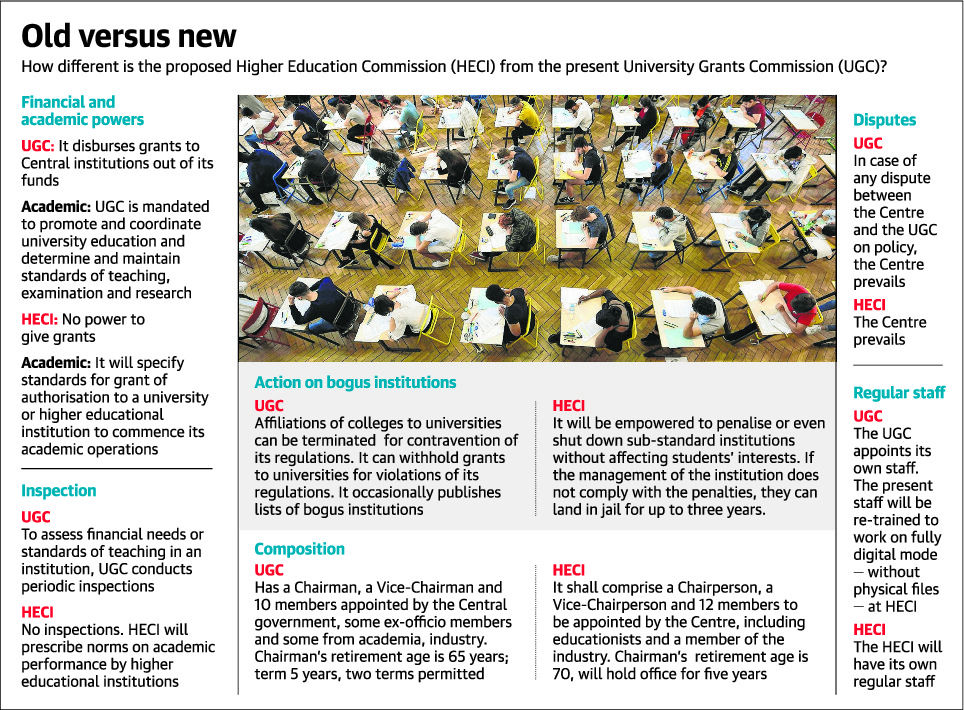Context:
- The government is set to replace the apex higher education regulator, University Grants Commission (UGC), with a higher education commission by repealing the UGC Act, 1951, for better administration of the HE sector.
- Centre has placed in the public domain a draft Bill for eliciting suggestions from educationists.
The Draft Bill
- The draft Higher Education Commission of India (Repeal of University Grants Commission Act) Act, 2018, takes away funding powers from the proposed regulator and gives it powers to ensure academic quality.
- The new regime separates the academic and funding aspects of higher education.
- While HECI will be in charge of ensuring academic quality in universities and colleges, the Ministry of Human Resource Development (MHRD) – or another mechanism that will be put in place later – will be responsible for funding universities and colleges.
- Another key feature of the draft legislation is that the Regulator will have powers to enforce compliance to the academic quality standards and will have the power to order closure of sub-standard and bogus institutions.
- Moreover, non-compliance could result in fines or even a jail sentence (Till now, the UGC had no such powers. All it could do was to release a list of bogus institutions and not recognise their degrees).
- All institutions approved by the UGC will have to comply with the academic standards laid down by HECI within three years after the new law is passed by Parliament and notified by the union government. If an institution fails to do so, its approval will be revoked.
Composition
- The HECI will have a Chairperson, a Vice-Chairperson and 12 other members to be appointed by the central government, including ex officio members, eminent academics and a doyen of industry.
- Of the 12 members, three members will represent union government namely: secretary of higher education, secretary of ministry of skill development and entrepreneurship and secretary, department of science and technology.
- The secretary of the commission will act as the member-secretary.
Functions
- HECI is tasked with the mandate of improving academic standards with specific focus on learning outcomes, evaluation of academic performance by institutions, mentoring of institutions, training of teachers, promote use of educational technology, etc.
- It will develop norms for setting standards for opening and closure of institutions, provide for greater flexibility and autonomy to institutions, lay standards for appointments to critical leadership positions at the institutional level irrespective of university started under any law.
Significance
- The transformation of the regulatory set-up is based on the principles of minimum government and maximum governance, separation of grant functions, end of inspection raj and focus on the academic quality.
- The draft Act is in accordance with commitment of the government for reforming the regulatory systems that provide more autonomy to higher education institutes to promote excellence and facilitate holistic growth of the education system.
- UGC staff would be retrained to adapt to the HECI regime, which would be fully digital and do away with file work.
Other plans to reform Higher Education sector
- Over the last four years, the HRD ministry has deliberated on several models like a single regulator for higher education by merging UGC, National Council of Teacher Education (NCTE) and All India Council for Technical Education (AICTE); however, the plans were not taken forward.
- Once the HECI Bill is passed by Parliament, the technical education regulator AICTE and the teachers’ education regulator NCTE will also be reformed on similar lines.
Opposition to HECI:
- All India University Employees Federation strongly opposed HECI.
- The University Grants Commission (UGC) has served India’s higher education system for over six decades.
- Named as the Higher Education Commission (HEC), this new institution will cover a considerable part of the UGC’s mandate, minus the latter’s financial role. This function will go to the Ministry of Human Resource Development (MHRD).
- Not surprisingly, the academic world is apprehensive that the move will increase the power of the ministry to curb what little autonomy is left in the system of higher education.
- The Yash Pal Committee never suggested that the UGC should be “scrapped.” The term it used was “subsumed,” pointing towards the need to let the UGC look after the crucial task of equitable distribution of funds, while a larger, essentially deliberative body looks after and encourages the long neglected task of building curricular and research bridges between different disciplines and disparate areas of higher professional learning.
- What is now being contemplated is the transfer of the UGC’s financial role to the MHRD. This is contrary to the Yash Pal Committee’s recommendations, even though the idea of bringing certain areas of professional education under the proposed HEC partially echoes the committee’s report.

.png)